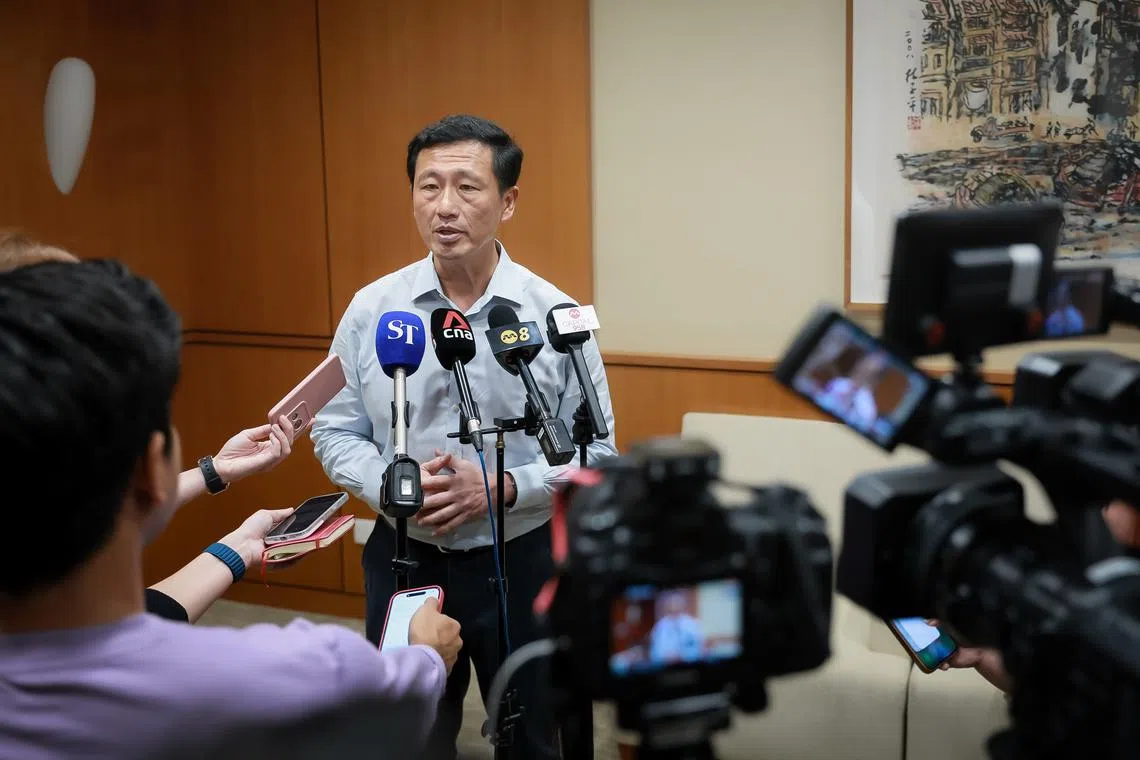Healthcare workers need better protection from abuse; new measures in place by June 2024: Ong Ye Kung
Sign up now: Get ST's newsletters delivered to your inbox

Health Minister Ong Ye Kung said medical staff should not be expected to tolerate abuse.
ST PHOTO: GAVIN FOO
SINGAPORE - By June 2024, all public healthcare institutions such as hospitals and polyclinics will implement a new standardised framework to curb abuse of healthcare workers.
The framework, launched on Dec 13, includes a common definition of abuse and harassment, standardised protocols for response and measures that can be taken against abusers.
This comes after the Tripartite Workgroup for the Prevention of Abuse and Harassment of Healthcare Workers released its findings in March 2023,
It found that more than two in three workers had witnessed or experienced abuse or harassment in the year preceding the survey. Among the affected workers, 75 per cent did not report the incidents, enduring the abuse in silence.
The workgroup comprises representatives from the Ministry of Health (MOH), Healthcare Services Employees’ Union, public healthcare clusters, community care partners and private healthcare providers.
Speaking to the media at the MOH headquarters, Health Minister Ong Ye Kung said healthcare workers have shouldered a heavy workload throughout the years, during the pandemic and also now during the Covid-19 wave in December,
While the vast majority of patients and their next of kin are respectful and appreciative towards healthcare workers, there is a small minority who resort to words and actions that are abusive, Mr Ong added.
“We really need to protect our healthcare workers against abuse and lift up their morale, because that is the best way to help them serve the great majority of Singaporeans and our patients,” he said.
Under the framework, abuse and harassment are defined as words, communications, actions or behaviours that are inappropriate, threatening and insulting, and cause a healthcare worker to feel intimidated, alarmed or distressed.
They also hinder staff’s ability to carry out their duties. Such cases can occur in both physical or virtual settings.
“To a healthcare worker, I think this is great comfort. It provides clarity – how (they) feel and how (an abuser’s) actions is being perceived by (healthcare staff) matters,” said Mr Ong, adding that medical staff should not be expected to tolerate abuse.
Standard protocols on dealing with incidents are set out in the framework, and it covers immediate incident response, reporting and post-incident management.
For example, to protect themselves during an incident, healthcare workers can take actions like firmly telling the perpetrator to stop, activating security personnel or administering restraints on the abuser as a last resort.
Each public healthcare institution will have a staff protection team to oversee proper and fair reviews of all abuse and harassment incidents.
Victims are also encouraged to call the police if they are threatened with harm or injured.
Healthcare institutions should consider giving affected staff time off to prepare for and attend police interviews.
They may also guide and support staff who wish to lodge a magistrate’s complaint or file a claim with the Protection from Harassment Court.
Necessary support such as medical treatment, reassignment of duties and mental health help will be offered to abuse victims, and such assistance should be extended to outsourced or contract-for-service staff who are working in the institutions.
Regardless of police outcomes and proceedings, healthcare institutions can also take concurrent and appropriate actions against perpetrators.
Depending on the severity of abuse or harassment, institutions may issue verbal or written warnings to perpetrators, disengage and bar abusive next of kin or visitors from visiting patients for a period of time, and refuse unreasonable requests.
Healthcare institutions can also discharge abusive patients who do not need urgent medical care and document the behaviour of recalcitrant abusers in their medical records so healthcare workers may take appropriate precautions.
Mr Ong emphasised that clinical care will not be compromised. Those who require care, even if they are abusive, will be attended to.
“The numbers (of such cases) are few. It really is the exception. If we can tackle the majority of the abuse cases, which are not by patients themselves, I think we would have taken a big step,” the minister said.
He added: “So we don’t try to solve 100 per cent of the cases. If we can solve most of the cases and allow our healthcare workers to feel that the public, MOH, their management and supervisors are supporting them, then we have gone a long way.”
National Healthcare Group (NHG) chief executive officer designate Joe Sim said the cluster has started working on implementing the framework, and by January 2024, care teams will be set up across all of NHG’s institutions.
Staff will be trained on how to handle cases of abuses, and affected staff will be given rest days to recuperate and readjust.
Mr Sim added that NHG has existing guidelines to deal with abuse, but the framework helps to remove ambiguity. “The framework has clear guidelines, definitions and protocols and that helps to clarify things,” he said.
National University Health System (NUHS) chief executive Yeoh Khay Guan said: “NUHS supports the standardised zero-tolerance policy for preventing abuse in healthcare institutions. This policy reinforces reporting and escalation channels while raising awareness of consequences for such behaviour.”
SingHealth group CEO Ivy Ng said: “We value our patients who entrust us with their care, and our staff who give of their best every day. We strive to provide a healing and safe environment and to do so, it is imperative that we treat each other with mutual respect and kindness.”


